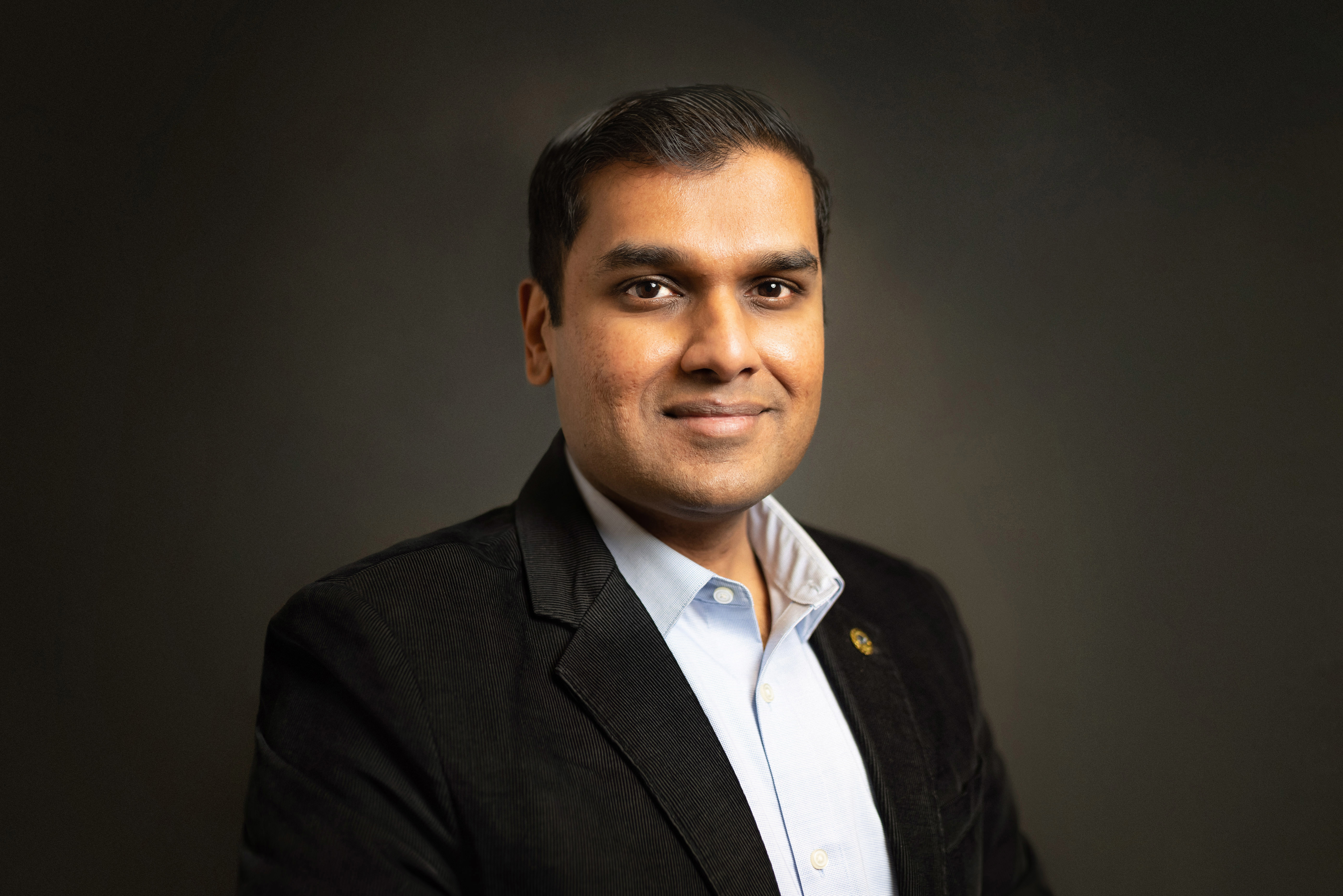
Ashwin Iyer, PhD, SMIEEE, SM-URSI
Personal Website: http://www.ece.ualberta.ca/~iyer
Contact
Professor; Director of Centre for Applied Research in Defence and Dual-use Technologies (CARDD-Tech); Director of Microwave, Millimetre Wave, and MetaDevices (M3) Laboratory, Faculty of Engineering - Electrical & Computer Engineering Dept
- ashwin.iyer@ualberta.ca
- Phone
- (780) 248-1921
- Address
-
11-235 Donadeo Innovation Centre For Engineering
9211 116 StEdmonton ABT6G 2H5
Overview
Area of Study / Keywords
Electromagnetics and Microwaves Sensors Photonics and Plasmas Electromagnetics RF Microwave Antennas Metamaterials Metasurfaces Periodic Structures Biomedical Engineering CARDD-Tech Leadership Team
About
Ashwin K. Iyer received the Ph.D. degree in electrical engineering from the University of Toronto, Ontario, Canada, in 2009. He joined the faculty of the University of Alberta Department of Electrical and Computer Engineering in the fall of same year and now holds the title of Professor. He serves as Founding Director of Centre for Applied Research in Defence and Dual-use Technologies (CARDD-Tech) and also Founding Director of the Microwave, Millimetre-wave, and MetaDevices (M3) Laboratory. He serves as Lead PI for a DND IDEaS Micro-net developing compact soldier-worn sensors and engineered surfaces for situational awareness of troop health in challenging environments, and one of two Co-PIs on a recently completed DND IDEaS Competitive Project 1A-B realizing robust sensors for fixed CAF assets in harsh Arctic conditions. He also leads multiple projects with defence and adjacent industry in the areas of low-SWaPC antenna and sensor platforms, resulting in multiple $Ms in operating and infrastructure funding to date. He has trained 24 graduate students, 5 postdoctoral fellows, and 2 research associates.
Dr. Iyer was part of the pioneering effort at the University of Toronto in the early 2000s in developing metamaterials that exhibit a negative refractive index and the demonstration of free-space subdiffraction imaging - contributions that have shaped the evolution of metamaterials research and mobilized later work in this area. He has co-authored over 200 peer-reviewed publications and 4 book chapters in the earliest reference texts on metamaterials/metasurfaces. He holds 3 issued and 4 pending US and Canadian patents. He has been recognized as a Senior Member of both the IEEE and the International Union of Radio Science (URSI) and has served the IEEE Antennas and Propagation Society (AP-S) in multiple capacities, including on the editorial board of the IEEE Transactions on Antennas and Propagation for the past 13 years first as an Associate Editor from 2012-2018 and as a Track Editor since 2019. He has served as Co-chair of the Technical Program Committees of the 2025, 2020, 2016, and 2015 IEEE International Symposia on Antennas and Propagation, with this year’s instalment to take place in Ottawa in July. In 2023, he was invited to participate in the Royal Canadian Navy’s Canadian Leaders at Sea program and helped organize the 2024 and 2025 instalments of the RCN Canadian Students at Sea program jointly with the U of A Faculty of Engineering. Dr. Iyer has received a number awards and recognitions, including the 2008 R.W.P. King Award, presented by the AP-S to an author less than 36 years of age for the best paper published in the IEEE Transactions on Antennas and Propagation during the previous year. He has received the IEEE AP-S Donald G. Dudley Jr. Undergraduate Teaching Award (2015), the University of Alberta Provost's Award for Early Achievement of Excellence in Undergraduate Teaching (2014), and the University of Alberta Rutherford Award for Excellence in Undergraduate Teaching (2018). He was the Lead Guest Editor for the IEEE Transactions on Antennas and Propagation Special Issue on Recent Advances in Metamaterials and Metasurfaces. He serves as Chair of the IEEE Northern Canada Section (NCS) Joint AP-S/MTT-S Chapter, and is a member of multiple IEEE AP-S standing committees. Dr. Iyer is a registered member of the Association of Professional Engineers and Geoscientists of Alberta (APEGA).
Research
Our research group seeks to apply principles of electromagnetics and RF/microwave engineering to important, current problems in defence, communications, and biomedicine, with the overarching theme of achieving multifunctional properties in a low-profile, conformal, or otherwise compact form factor. Projects typically involve government and industry sponsors, and span the gamut of the research life cycle from theory to simulation to fabrication to experimental validation, towards deployment in industry or in the field. Some research directions are listed below:
RF/microwave circuits and transmission-line techniques
- Embedded metamaterial-based EBGs for multi-band, multi-functional, and/or EMI-resistant devices on a minimal number of PCB layers
- Multiconductor transmission-line modeling of metamaterials, EBGs, and other physical phenomena
Fundamental electromagnetic theory
- Trade-offs of antenna size, bandwidth, radiation efficiency, and polarization
- Mechanisms of subdiffraction imaging and sensing
- Complex modes, the theory of FSSs, and extraordinary transmission
- Effective-medium/homogenization theories and techniques
Novel concepts in antenna theory and design
- Extreme antenna miniaturization and dispersion-engineered inherent matching to arbitrary dielectric environments
- Beamshaping radome-embedded structures for radiation-pattern control and signature management
- New antenna topologies for IoT, RFID, GPS, GPR, 5G
- Compact, multifunctional, energy-autonomous wireless sensor antennas for wearable and other sensing applications in harsh (e.g. extreme cold-weather) environments
Metamaterial/metasurface devices and their applications
- Miniaturized waveguide devices
- Metamaterial solutions for high-field MRI
- Conformal metasurfaces for antenna beamshaping
- Metamaterial-enhanced sensing and refractometry
- Metamaterial-enabled subdiffraction imaging/lensing
- THz-IR-optical plasmonic metasurfaces
Teaching
Teaching Awards
- University of Alberta Rutherford Award for Excellence in Undergraduate Teaching (2018)
- IEEE Antennas and Propagation Society Donald G. Dudley Jr. Undergraduate Teaching Award (2015)
- University of Alberta Provost's Award for Early Achievement of Excellence in Undergraduate Teaching (2014)
- University of Toronto Department of ECE Teaching Excellence Recognition (2004, 2005, 2006)